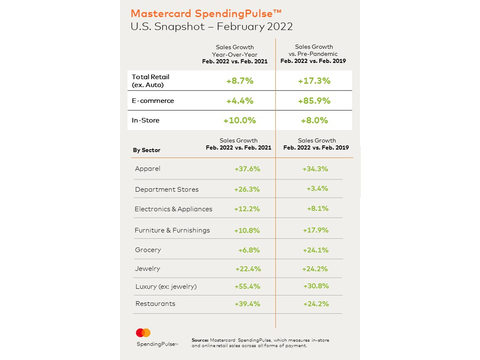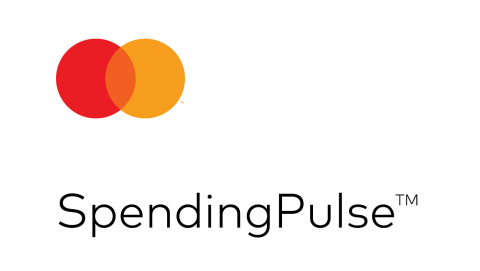Mastercard SpendingPulse: February U.S. Retail Sales Rise 8.7% Year-over-Year* Amid Inflation, Return to Office
Mastercard SpendingPulse: February U.S. Retail Sales Rise 8.7% Year-over-Year* Amid Inflation, Return to Office
PURCHASE, N.Y.--(BUSINESS WIRE)--U.S. consumer spending maintained positive momentum in February, according to Mastercard SpendingPulseTM, which measures in-store and online retail sales across all forms of payment. Overall retail sales excluding auto increased 8.7% year-over-year (YOY) and were up 17.3% compared pre-pandemic spending (2019). This is slightly above January growth levels.
When looking across channels, in-store grew 10% in February compared to the same month last year and 8.0% vs. pre-pandemic as consumers resume in-person activity. E-commerce sales in February were up 4.4% year-over-year and 85.9% vs. pre-pandemic as the shift to digital remains a persistent yet slowing trend.
The elevated level of inflation is reflected in the February retail sales increases; other key trends include:
- Return to office attire: Apparel (+37.6% YOY / +34.3% pre-pandemic) and Department Store (+26.3% YOY / +3.4% pre-pandemic) growth rates remained elevated for the month as consumers prepare to return to physical offices, updating their wardrobes after nearly two years of working remotely.
- In-store growth rates rallied: As noted, in-store growth rates rallied through much of February, up 10% compared to last year and 8.0% vs. pre-pandemic. Contributing factors include the fact that heavy winter storm activity suppressed in-store sales in large portions of the U.S. this month last year, as well as the fact that many Covid restrictions were removed this month.
- Home décor discounts: Furniture and Furnishings sales spiked in February around the traditional President’s Day weekend, driving growth rates +10.8% YOY and +17.9% compared to pre-pandemic 2019 levels for the month.
- Restaurant resurgence: Restaurant sales (+39.4% YOY / +24.2% pre-pandemic) continued to outperform in February with growth rates in the 30-40% range across most states.
“Despite inflation, consumers are putting their record savings to work and expressing themselves through fashion again—much to the benefit of the Apparel, Department Store, Luxury and Jewelry verticals, according to Mastercard SpendingPulse,” said Steve Sadove, senior advisor for Mastercard and former CEO and Chairman of Saks Incorporated.
*Excluding automotive sales
About Mastercard SpendingPulse:
Mastercard SpendingPulse reports on national retail sales across all payment types in select markets around the world. The findings are based on aggregate sales activity in the Mastercard payments network, coupled with survey-based estimates for certain other payment forms, such as cash and check. Mastercard SpendingPulse defines “U.S. retail sales” as sales at retailers and food services merchants of all sizes. Sales activity within the services sector (for example, travel services such as airlines and lodging) are not included.
About Mastercard (NYSE: MA)
Mastercard is a global technology company in the payments industry. Our mission is to connect and power an inclusive, digital economy that benefits everyone, everywhere by making transactions safe, simple, smart and accessible. Using secure data and networks, partnerships and passion, our innovations and solutions help individuals, financial institutions, governments and businesses realize their greatest potential. Our decency quotient, or DQ, drives our culture and everything we do inside and outside of our company. With connections across more than 210 countries and territories, we are building a sustainable world that unlocks priceless possibilities for all.
www.mastercard.com
Contacts
Media Contacts
Julia Monti, Mastercard
914-249-6135 | Julia.monti@mastercard.com
Alexandria Brown, Mastercard
914-260-1020 | Alexandria.brown@mastercard.com

